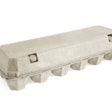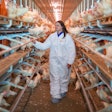
A large portion of family-owned egg farms that are still in business today could potentially be out of business in the next five years due to U.S. layer housing laws forcing producers to spend millions to go cage-free or get out of the egg business.
Even though there is still a lot of debate concerning which housing type is better for the birds on the producer, researcher and consumer levels, cage-free mandates and retail/foodservice future cage free purchase pledges are still being made and implemented. Depending on where you live and who you produce for, these commitments are forcing U.S. egg producers to either convert to cage-free egg production or leave the egg business altogether.
If the egg industry continues to move toward cage-free egg production, the number of smaller family farms producing eggs in the U.S. will decrease, putting the market and supply into the hands of the larger companies that can obtain financing and have succession plans in place to transition to cage free, earning them an adequate long-term return on investment.
It’s interesting that this is the future of the U.S. egg industry. I could argue that a large portion of consumers who choose cage-free eggs over conventional eggs are the same consumers who choose local, family farm products over commercial, mass-produced products. Meaning, the cage-free laws that they voted may be working against their wishes for products from family farms.
Furthermore, not every egg producer that lives in a cage-free mandated state, or that produces for a pledged customer, has converted their farm yet. Some producers could be holding out to see if their state or customer will actually honor its cage-free deadline. Maybe they don’t want to rush into a risky decision and spend millions of dollars to convert. Or maybe they just don’t want to make the choice to go out of business yet.

















